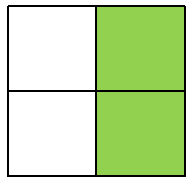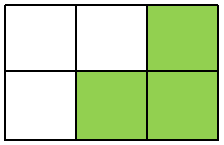CLASS-6
EQUIVALENT FRACTION
EQUIVALENT FRACTION -
Equivalent fractions are fractions that represent the same value or quantity, even though they may look different. To find equivalent fractions, you can multiply or divide both the numerator and denominator of a fraction by the same non-zero number.

From above picture you can observe that, there are 4 squares/blocks, in between two blocks/blocks are green color and two squares/blocks are
Green color block 2
white color. So, we can put the fraction as ---------------- = ----
Total blocks 4
2 1
If, we simplify the fraction, then it comes ------ = ------
4 2

From above picture you can observe that, there are 4 squares/blocks, in between three blocks/blocks are green color and two squares/blocks are
Green color block 3
white color. So, we can put the fraction as ---------------- = ----
Total blocks 6
3 1
If, we simplify the fraction, then it comes ------ = ------
6 2
2 3 1
------ = ------ = ------
4 6 2
so, 2/4 and 3/6 are equivalent fraction, because they represent the same value.
Here are some methods to find equivalent fractions:
- Multiplication:- To find an equivalent fraction, multiply both the numerator and the denominator of the original fraction by the same non-zero number.
For example: Equivalent fractions of 1/2:
- Multiply both the numerator and denominator by 2: (1*2) / (2*2) = 2/4
- Multiply both the numerator and denominator by 3: (1*3) / (2*3) = 3/6
- Multiply both the numerator and denominator by 4: (1*4) / (2*4) = 4/8
All these fractions (2/4, 3/6, 4/8) are equivalent to 1/2 because they represent the same value.
- Division:- To find an equivalent fraction, divide both the numerator and the denominator of the original fraction by the same non-zero number.
For example: Equivalent fractions of 4/8:
- Divide both the numerator and denominator by 2: (4 ÷ 2) / (8 ÷ 2)= 2/4
- Divide both the numerator and denominator by 4: (4 ÷ 4) / (8 ÷ 4)= 1/2
Both 2/4 and 1/2 are equivalent to 4/8.
- Simplification:- If you have a fraction that can be simplified further (i.e., the numerator and denominator have a common factor), you can simplify it to its lowest terms to find equivalent fractions.
For example: Equivalent fractions of 6/9:
- Divide both the numerator and denominator by their greatest common factor (GCF), which is 3: (6 ÷ 3) / (9 ÷ 3) = 2/3
Both 6/9 and 2/3 are equivalent fractions.
Remember, you can find an infinite number of equivalent fractions for any given fraction by applying these methods. Equivalent fractions are useful in various mathematical operations and comparisons, as they allow us to work with fractions in different forms while still representing the same value.